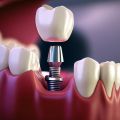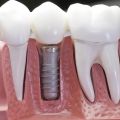7 Facts About Dental Implants
Dental implants have become one of the most popular and effective solutions for restoring lost teeth. Modern technologies and materials make them durable, safe, and almost indistinguishable from natural teeth. Below are seven interesting and important facts about dental implants that will help you better understand this prosthetic method.
1. Dental implants imitate the tooth root
The main difference between a dental implant and other prosthetic methods is that the implant replaces not only the visible part of the tooth (the crown) but also its root. The implant is made of biocompatible titanium and is inserted into the jawbone, where it binds to the bone tissue over time. This ensures the stability and strength of the structure and prevents bone loss that can occur when the tooth root is missing.
2. Implant installation is a painless procedure
Many people are afraid of dental implants because they expect pain. However, modern anesthesia methods make this procedure almost painless. The doctor uses local anesthesia and the patient feels no pain when the implant is inserted. Some discomfort and swelling may occur after the procedure, but this disappears quickly and can easily be remedied with medication. Most patients note that installing an implant is easier than extracting a tooth.
3. High success rate for the procedure
The dental implant procedure has a high success rate of 95 to 98%, depending on the health of the patient and the experience of the doctor. Modern diagnostic and planning methods help minimize the risk of complications and implant rejection. Most people who undergo implantation can enjoy the results for many years with proper oral care.
4. Ideal option if one or more teeth are missing
Dental implants can be used to replace a single tooth or restore multiple missing teeth. If all the teeth in one jaw are lost, it is possible to get full-mouth dental implants. This can significantly improve the patient's quality of life and restore their ability to chew, speak, and smile comfortably.
5. The process of osseointegration is the key to success
One of the main factors in the success of dental implants is the osseointegration process. This is a process where the titanium that makes up the implant fuses with the jawbone, creating a strong connection. Osseointegration takes three to six months, depending on bone health and the type of implant used. This process makes the implant stable and able to withstand chewing stress, just like a natural tooth.
6. Implants prevent changes in the shape of the face
When a tooth is lost, the jawbone begins to atrophy due to lack of stress. This leads to changes in the shape of the face and the appearance of wrinkles and holes instead of lost teeth. Implants help prevent this by putting pressure on the bone, stimulating its growth, and preventing bone loss. Implants therefore not only play an important role in restoring dental function but also in preserving natural facial contours.
7. Materials used in implants are hypoallergenic
Titanium, a biocompatible and hypoallergenic material, is used to make dental implants. This means that the probability of an allergic reaction to the implant is extremely low. Titanium doesn’t cause inflammation and is accepted by the body as its own tissue, making it perfect for long-term use in the oral cavity. Some implants also have a zirconium coating, which increases their biocompatibility and promotes faster tissue healing.
The bottom line
Dental implants are a reliable and permanent method of restoring lost teeth while providing comfort and a natural appearance. They help maintain oral health by preventing bone loss and changes in facial shape, which is particularly important for the patient's aesthetics and quality of life. Due to the procedure's high success rate and longevity, implants are becoming more and more popular among people who want to restore their smile. If you are considering dental implants, be sure to consult a qualified dentist who can help you choose the best treatment plan for your case.
Other articles and publications:
Articles and publications of other companies:
- +1 (646) 270-9836
- Long Island City
- grantny.com








